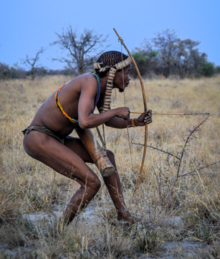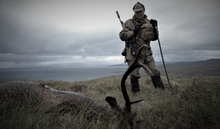
Back Jag AF Mi'adop AMI Caza AN صيد Arabic Caza AST Ovçuluq AZ اووچولوق AZB Һунар BA Паляванне BE Паляваньне BE-X-OLD

Hunting is the human practice of seeking, pursuing, capturing, and killing wildlife or feral animals.[10] The most common reasons for humans to hunt are to obtain the animal's body for meat and useful animal products (fur/hide, bone/tusks, horn/antler, etc.), for recreation/taxidermy (see trophy hunting), although it may also be done for resourceful reasons such as removing predators dangerous to humans or domestic animals (e.g. wolf hunting), to eliminate pests and nuisance animals that damage crops/livestock/poultry or spread diseases (see varminting), for trade/tourism (see safari), or for ecological conservation against overpopulation and invasive species (commonly called a cull).
Recreationally hunted species are generally referred to as the game, and are usually mammals and birds. A person participating in a hunt is a hunter or (less commonly) huntsman; a natural area used for hunting is called a game reserve; and an experienced hunter who helps organise a hunt and/or manage the game reserve is also known as a gamekeeper.

Hunting activities by humans arose in Homo erectus or earlier, in the order of millions of years ago. Hunting has become deeply embedded in various human cultures and was once an important part of rural economies—classified by economists as part of primary production alongside forestry, agriculture, and fishery. Modern regulations (see game law) distinguish lawful hunting activities from illegal poaching, which involves the unauthorised and unregulated killing, trapping, or capture of animals.

Apart from food provision, hunting can be a means of population control. Hunting advocates state that regulated hunting can be a necessary component[11] of modern wildlife management, for example to help maintain a healthy proportion of animal populations within an environment's ecological carrying capacity when natural checks such as natural predators are absent or insufficient,[12][13] or to provide funding for breeding programs and maintenance of natural reserves and conservation parks. However, excessive hunting has also heavily contributed to the endangerment, extirpation and extinction of many animals.[14][15] Some animal rights and anti-hunting activists regard hunting as a cruel, perverse and unnecessary blood sport.[16][17] Certain hunting practices, such as canned hunts and ludicrously paid/bribed trophy tours (especially to poor countries), are considered unethical and exploitative even by some hunters.

Marine mammals such as whales and pinnipeds are also targets of hunting, both recreationally and commercially, often with heated controversies regarding the morality, ethics and legality of such practices. The pursuit, harvesting or catch and release of fish and aquatic cephalopods and crustaceans is called fishing, which however is widely accepted and not commonly categorised as a form of hunting. It is also not considered hunting to pursue animals without intent to kill them, as in wildlife photography, birdwatching, or scientific-research activities which involve tranquilizing or tagging of animals, although green hunting is still called so. The practices of netting or trapping insects and other arthropods for trophy collection, or the foraging or gathering of plants and mushrooms, are also not regarded as hunting.[18]

Skillful tracking and acquisition of an elusive target has caused the word hunt to be used in the vernacular as a metaphor for searching and obtaining something, as in "treasure hunting", "bargain hunting", "hunting for votes" and even "hunting down" corruption and waste.
- ^ Oxford Dictionary of English. Stevenson, Angus (3 ed.). Oxford: Oxford University Press. 2010. p. 856. ISBN 9780199571123. OCLC 729551189.
'hunt [...] pursue and kill (a wild animal) for sport or food [...]'; 'hunting [...] the activity of hunting wild animals or game.'
{{cite book}}: CS1 maint: others (link) - ^ Peterson, M. Nils (2019), "Hunting", in Fath, Brian D. (ed.), Encyclopedia of Ecology, vol. 3 (2 ed.), Elsevier, pp. 438–440, doi:10.1016/b978-0-12-409548-9.11168-6, ISBN 978-0-444-64130-4,
Hunting is the practice of pursuing, capturing, or killing wildlife.
- ^ Park, Chris; Allaby, Michael (2013). A Dictionary of Environment and Conservation (2 ed.). Oxford: Oxford University Press. p. 208. ISBN 978-0-19-964166-6. OCLC 993020467.
hunting The activity of finding and killing or capturing wild animals for food, pelts, or as a field sport.
- ^ Neves-Garca, Katja (2007). "Hunting". In Robbins, Paul (ed.). Encyclopedia of Environment and Society. Vol. 3. Thousand Oaks: SAGE Publications. pp. 894–896. ISBN 978-1-4129-5627-7. OCLC 228071686.
In very general terms, hunting refers to the activity of pursuing and killing free-roaming animals.
- ^ Collin, P. H. (Peter Hodgson) (2009). Dictionary of Environment and Ecology: Over 7,000 terms clearly defined. Bloomsbury Reference (5 ed.). London: Bloomsbury. p. 108. ISBN 978-1-4081-0222-0. OCLC 191700369.
hunting [...] the activity of following and killing wild animals for sport
- ^ "HUNTING | meaning in the Cambridge English Dictionary". Cambridge English Dictionary. Archived from the original on 10 December 2019. Retrieved 10 December 2019.
hunting [...] chasing and killing an animal or bird for food, sport, or profit
- ^ "Hunting definition and meaning | Collins English Dictionary". Collins English Dictionary. Archived from the original on 10 December 2019. Retrieved 10 December 2019.
Hunting is the chasing and killing of wild animals by people or other animals, for food or as a sport.
- ^ "hunting | History, Methods, & Management". Encyclopedia Britannica. Archived from the original on 10 December 2019. Retrieved 10 December 2019.
Hunting, sport that involves the seeking, pursuing, and killing of wild animals and birds, called game and game birds, [...]
- ^ Cartmill, Matt (1996). A View to a Death in the Morning: Hunting and Nature Through History (1 ed.). Cambridge, Massachusetts: Harvard University Press. ISBN 9780674029255. OCLC 298105066.
- ^ [1][2][3][4][5][6][7][8][9]
- ^ Williams, Ted. "Wanted: More Hunters," Audubon magazine, March 2002, copy retrieved 26 October 2007.
- ^ "Recreational Hunting Areas". doc.govt.nz. Archived from the original on 13 August 2019. Retrieved 13 August 2019.
- ^ Harper, Craig A. "Quality Deer Management Guidelines for Implementation" (PDF). Agricultural Extension Service, The University of Tennessee. Archived from the original (PDF) on 12 September 2006. Retrieved 20 December 2006.
- ^ Nugent, Graham; Choquenot, David (2004). "Comparing Cost-Effectiveness of Commercial Harvesting, State-Funded Culling, and Recreational Deer Hunting in New Zealand". Wildlife Society Bulletin. 32 (2): 481–492. doi:10.2193/0091-7648(2004)32[481:CCOCHS]2.0.CO;2. ISSN 0091-7648. JSTOR 3784988. S2CID 86110872.
- ^ "Red List Overview". IUCN Red List. International Union for Conservation of Nature. Retrieved 8 September 2010.
- ^ "Why Sport Hunting Is Cruel and Unnecessary". PETA. 15 December 2003. Archived from the original on 23 November 2013. Retrieved 20 March 2020.
- ^ "Hunting". Animal Ethics. Archived from the original on 9 September 2017. Retrieved 20 March 2020.
- ^ "10 Hunting - Hunting Equipment Reviews And Buying Guide". Archived from the original on 20 February 2023. Retrieved 20 February 2023.